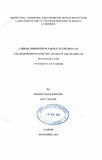| dc.contributor.author | Ole Kamwaro, Martin | |
| dc.date.accessioned | 2013-02-12T14:44:26Z | |
| dc.date.available | 2013-02-12T14:44:26Z | |
| dc.date.issued | 2012 | |
| dc.identifier.uri | http://erepository.uonbi.ac.ke:8080/xmlui/handle/123456789/8385 | |
| dc.description.abstract | The main aim of this study is to analyze the extent to which human rights are protected. observed and enforced in the cut tlower industry in Kenya. The study focuses on three rights. namely. freedom of association. freedom from sexual harassment and the right to a cLean. healthy and safe environment. The cut-flower sector falls under the agricultural industry. with the principal applicable laws being the Constitution of Kenya 2010. Employment Act. Labour Relations Act. Labour Institutions Act. Work Injury Benefits Act and the Occupational Safety and Health Act (OSHA). Another relevant statute is the Sexual Harassment Act. The legal provisions on freedom of expression. prohibition of sexual harassment and the right to a clean. healthy and safe work environment guaranteeing protection of employees' health lay a solid ground for protection of workers. National laws on these three human rights trace their origin to international and regional instruments under the United Nations, International Labour Organization and African Charter frameworks. respectively. The United Nations human rights framework is grounded on the theme: 'Respect. Protect and Remedy.' In spite of having all these laws. there are challenges with regard to compliance with and effective enforcement of the applicable labour laws. This study is significant to the extent that it is an effort to contribute to the making of a case for the improvement of the conditions in which cut flower farm employees work. with particular emphasis on the three human rights. The study examines provisions contained in the various international. regional and national legal instruments dealing with the three rights identified above. The frameworks under the United Nations. International Labour Organization and African Charter are discussed. National laws examined include those specified above. The stud) analyses and critiques the extent to which the applicable laws are complied with by flower farm owners and employers as well as the government and makes recommendations for legal reform. | en_US |
| dc.language.iso | en_US | en_US |
| dc.publisher | University of Nairobi, Kenya | en_US |
| dc.title | Protecting, observing and enforcing human rights for labourers in the cut flower industry in Kenya: a critique | en_US |
| dc.title.alternative | Thesis (LLM) | en_US |
| dc.type | Thesis | en_US |

